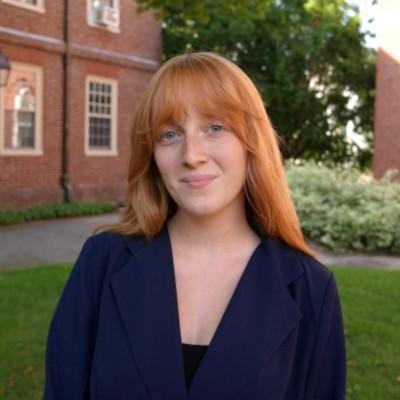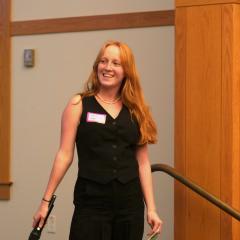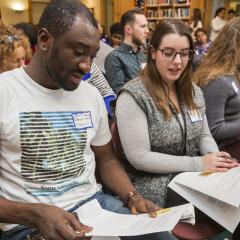Finding Common Ground in a Divided Era: Insights from 80 Strangers in Harvard Square
In 2025, our summer program intern via the Harvard Mindich Service Fellowship program was Sophia Robertson, a rising sophomore from Cambridge, MA. One of the projects she initiated during her internship aimed to explore how people in Cambridge are perceiving the role and potential of dialogue in the current moment. After interviewing 80 participants together with Center staff, she shared her findings in the following essay.
In efforts to engage in dialogue across difference, the paradigm often shifts from good-faith dialogue seeking mutual understanding towards dialogue as a functional process to gain information about out-groups (Skrefsrud 2018). This distinction is most striking in times of political extremism and social polarization, when rampant tribalism and harsh othering of the out-group makes true common ground difficult to find. This summer, the Ikeda Center set out to better understand how people are grappling with dialogue, common ground, and the divided era we now live in. As such, this survey aims to expand the qualitative literature on mid-2025 public opinion surrounding dialogue across difference, misunderstandings, and the broader political situation.
Over two afternoons in Cambridge’s bustling Harvard Square, our team—Preandra, Anri, Lillian, and I—set up a table near the Smith Campus Center and invited passersby to share their thoughts. In exchange for “two minutes and a chance to win a gift card,” eighty individuals, aged 15 to 91, paused their busy days to reflect with us. While our survey was not designed to be representative, the range of voices we heard—56 women and 24 men, from teenagers to retirees—offered a textured glimpse into public attitudes toward dialogue today.
Methods
Participants gave consent to short audio-recorded interviews and were asked up to five open-ended questions, ranging from “Is it harder to find common ground in conversations than it used to be?” to “What scares or intimidates you in conversations on tough topics?” and “Is a lack of dialogue impacting the political situation?” We also asked about age and gender to explore demographic patterns in responses.
Back at the Center, our team transcribed 65 full interviews and began identifying recurring themes. What emerged was a rich portrait of the hopes, fears, and frustrations shaping dialogue in 2025.
Common Ground
When asked whether it’s harder to find common ground in conversations than it used to be, the answer is a resounding ‘yes’. Social media and information divides are top of mind, with nearly 30% highlighting technology as a key factor influencing dialogue; of these, over 70% feel that social media and technology make common ground harder to achieve. Others cited entrenched views (18%), rising tribalism (7%), and fear of difficult conversations (6%) as barriers. A smaller group emphasized that dialogue thrives when rooted in practice with in-person communication (6%) and awareness of personality differences (4%). As one participant put it, “As we continue to use more and more social media…people get very, very involved in their opinions, and they’re less likely to actually reach out to other people with differing opinions.” Another participant noted, “People are so scared of discussing things that used to be our common values, I thought, at least. And it’s something that’s no longer common. We don’t know what our common ground is.”
Most relevant to our work at the Center, many participants expressed interest in community opportunities to practice having difficult dialogues, citing lack of educational opportunities around dialogue as a key factor contributing to today’s division. As one participant lamented, “people don’t really practice having healthy dialogue a lot…and when I was in school, we didn’t really explicitly get taught how to do that.”
Dialogue Fears
Next, we asked participants to dive deeper into their dialogue experiences and discuss fears around conversations on tough topics. Despite many noting that finding common ground is difficult, a plurality of participants (26%) cited no fears in dialogue, or at least a sense that engaging in difficult conversations is better than the alternative. One remarked, “If you don’t talk about [intimidating topics], you’re just going to dig yourself in a deeper hole”; another noted, “I’m the one who’s always speaking out.” But many participants do report fears in dialogue: 16% fear conflict and an inability to find common ground; 13% fear judgment; 10% fear certain topics, whether political, personal, or otherwise; 8% fear strong emotions; 8% fear feeling uninformed, and 7% fear offending their counterpart. These diverse and wide-ranging fears make it clear that dialogue struggles do not exist in a monolith, and efforts to advance dialogue education must recognize and address these fears.
Gender differences were striking: men were more likely to say they had no fears in dialogue (35% vs. 23% of women), while women were more likely to fear strong emotions, conflict, and judgment. This aligns with past research indicating that women are more conflict-avoidant than men (Trnka 2012), and the literature also finds that masculine role socialization discourages admitting fear, likely contributing to higher male reporting of fearlessness in dialogue (Addis & Mahalik 2003). But many women felt fearless too – including one woman who confidently asserted, “I’m more willing to broach a conversation about something difficult than I think a lot of other people are. I don’t have a problem with it.”
Curious about specific examples of these fears and struggles to find common ground, we asked participants to share a difficult dialogue they’ve had recently. Responses ranged from tough breakups to salary negotiations to political conversations with protesters, but participants predominantly cited topics related to politics (36.2%) and family (34.5%). Male participants disproportionately cited dialogues about romantic relationships, while female participants disproportionately cited conversations on politics, future plans, friendships, and race. These findings implicate key niches for dialogue education. Dialogue events in particular can aim to simulate a wide range of difficult conversations, giving participants opportunities to practice tough topics from friendships to politics to race.
Generational Divides
Next, we aimed to understand the generational divides underlying struggles to engage in productive dialogue. We asked participants, “What do you think other people don’t quite understand about you and your generation?” Responses were striking. Older generations predominantly feel that young people misunderstand or fail to appreciate the effort put in by older people, ignoring their struggles and only seeing their own. One 81-year-old woman commented, “I was young once, that’s what young people forget…I think it’s universal.” A 73-year-old man noted, “The younger generation doesn’t understand the extent to which we fought for stuff…some of us had to stop a war.” Some participants mentioned a generational decline in respect for elders, with a 45-year-old answering, “What people don’t really understand about our generation is that respect was held to the utmost.”
Young people particularly emphasize misunderstandings of their struggles, with 22% of all participants referencing societal struggles as a key misunderstanding faced by their generation. These include complex relationships with ethnicity, race, and religion; changing social justice dynamics; and financial struggles that older generations don’t understand. One 27-year-old woman said, “They don’t understand how difficult it is…. My dad [said], ‘you should save up to try to get a home’ – [but] that’s never gonna happen.” A teenager commented, “I don’t think people are willing to consider the context that we’ve been born into…the things we’re forced to confront now that many generations won’t have to.” These sentiments aren’t unique to Gen Z – young millennials are also echoing sentiments of misunderstanding by older generations, feeling that the rights they fought for are being stripped away by those in power. “My generation started heading towards more acceptance [of others],” one woman in her 30s noted, “…now these rights are being jeopardized.”
Politics
Finally, participants were nearly unanimous in connecting dialogue – or its absence – to the current political turmoil. Regardless of their political views (and with no requirement to share them), participants generally shared their belief that a lack of good dialogue is impacting the political situation. Defining that absence of good dialogue, participants predominantly mention bad-faith dialogue and political conversations turning personal. They also cite rampant extremism, fear of difficult topics, misinformation, and a broad lack of dialogue education and opportunities to engage in good dialogue. Other participants mention societal unwillingness to engage with new ideas, media dynamics, struggles to humanize dialogue counterparts, and struggles with elected officials who seem disconnected from their constituencies.
The public diagnosis is clear: dialogue is in crisis, and opportunities to engage in good dialogue are few and far between. When dialogue does happen, participants said, it occurs in siloed, echo-chamber environments. A few critical responses:
- “You’ll see on TV or YouTube, these attacks against somebody who has a different belief…and their whole purpose is to shut them down, not to listen to them. That’s really woven into our society right now.”
- “People aren’t trained in civic discourse…people just need to be more willing to say, ‘actually, I don’t know about that, can you tell me more?’”
- “There’s a lack of educated conversation – a lot of people put their voice in but they don’t actually know what they’re talking about.”
- “There’s not a lack of conversation, but a lack of structured conversation.”
- “We don’t dialogue, we monologue. We wait to hear trigger words to trigger our next monologue…We need to practice, but we lack the skills to practice.”
- “There should be more environments that make dialogue between polar sides possible without it becoming an argument, but more so a discussion. And I don’t think there are many environments where that can happen peacefully.”
Why These Voices Matter
The public sees what’s reflected in the literature: the goal of public dialogue often unconsciously shifts away from mutual understanding, towards simple information-gathering and combative debate. The Ikeda Center has long championed dialogue towards mutual understanding as a principle and a practice essential for peace. These findings reaffirm that dialogue is not just an ideal, but a daily struggle – shaped by generational experiences, evolving technologies, and divisive politics. In one local survey, we learned how unheard people feel – and how, collectively, they’re wishing for productive dialogue across differences. The results of this survey remind us that creating spaces for difficult conversations remains vital.
At a time when it feels easy to retreat into silence or like-minded circles, the voices of 80 strangers in Harvard Square remind us: dialogue matters, and the dialogues that matter most are the ones that are difficult, thought-provoking, and truly build mutual understanding.



